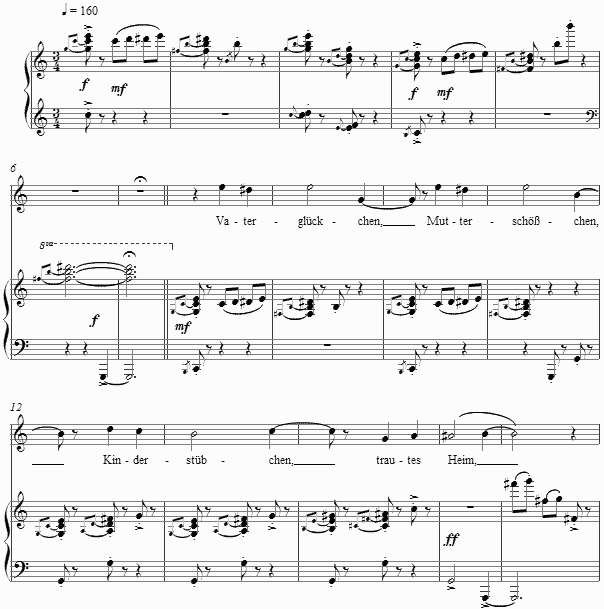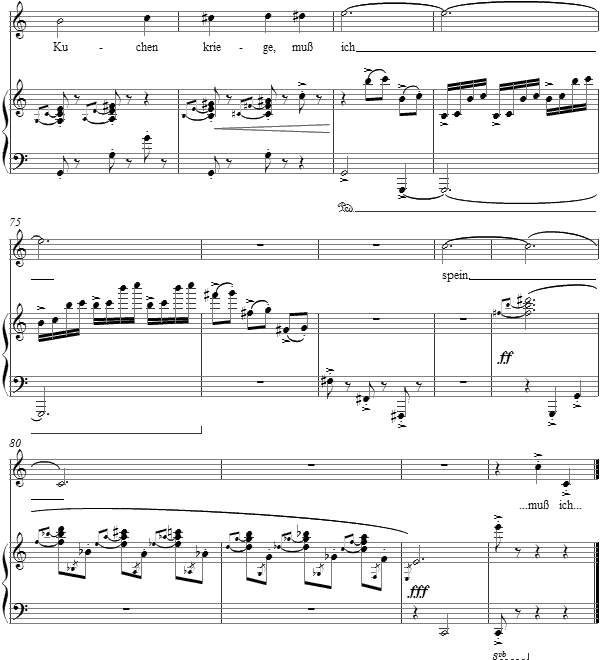Music and Texts of GARY BACHLUND
Vocal Music | Piano | Organ | Chamber Music | Orchestral | Articles and Commentary | Poems and Stories | Miscellany | FAQs
Aus meiner Kinderzeit - (2009)
Joachim Ringelnatz
for medium voice and piano
Vaterglückchen, Mutterschößchen,
Kinderstübchen, trautes Heim,
Knusperhexlein, Tante Rhös'chen,
Kuchen schmeckt wie Fliegenleim.
Wenn ich in die Stube speie,
Lacht mein Bruder wie ein Schwein.
Wenn er lacht, haut meine Schwester.
Wenn sie haut, weint Mütterlein.
Wenn die weint, muß Vater fluchen.
Wenn er flucht, trinkt Tante Wein.
Trinkt sie Wein, schenk sie mir Kuchen:
Wenn ich Kuchen kriege, muß ich spein.[ 4 pages, circa 1' 35" ]
Joachim Ringelnatz
From My Childhood
Papa's cheer, Mommy's lap of course,
Play rooms in the cozy home I knew,
Gingerbread witches, Auntie Hobbyhorse,
And god-awful pies that tasted like fly paper glue.
When sick in the parlor, I hurled and slobbered,
My brother laughed like a pig in a sty.
When he laughed, my sister would get clobbered,
And when she hit him back, my Mommy would cry.
Such ruckus and bawling set Papa to flight,
But when he fled, Auntie guzzled the booze.
When she drank, she baked pies out of spite:
And when they were gobbled, I'd hurl on my shoes.
Rhymed paraphrase by the composer
This delectably horrid and viscerally flavored sense memory of childhood would have been unthinkable in poetry of an earlier age, but as a humorist and cabaret performer Ringelnatz managed with charm to slip such nonsense into the ranks of literature as well as entertainment.
The text is drawn from the 1927 collection, Reisebriefe eines Artisten, Ernst Rowohlt, Berlin. As copyright laws differ between Europe and the US thanks to the "Mickey Mouse" copyright law passed by a Disney-boot-licking Congress, this text is oddly under copyright protection in the United States, while in the public domain in Europe. Therefore someone wishing to perform the song in Europe need only do so, while an American must wait more than a decade because American politicians kissed Mickey's backside, an cartoon image worth picturing.
The tonic "slips" down by a half-step in the short introduction from C to B. As we shall hear, the same gesture appears in a number of disparate tonal domains, before a final downward slide by half steps to the final cadence and end of this tale. As counterbalance to the opening gesture, the other harmonic motion rises by whole tones as in measure 14, before the half cadence on the dominant. The vocal line begins at the highest point of the tessitura so as to assure that this musical portrait is no sweet and ordinary reminiscence.
The ending rushes to match the greatest image of the poem, a pent up release which slips from B major over C downward to the last chord and repetition of the text, "I must!" The fall of an octave in the vocal line is meant to be -- shall we say -- picturesque.
The score for Aus meiner Kinderzeit is available as a free PDF download, though any major commercial performance or recording of the work is prohibited without prior arrangement with the composer. Click on the graphic below for this piano-vocal score.


